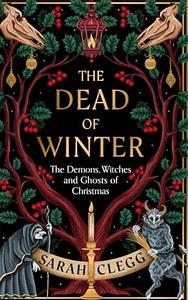Take a photo of a barcode or cover
239 reviews for:
The Dead of Winter: Beware the Krampus and Other Wicked Christmas Creatures
Sarah Clegg
239 reviews for:
The Dead of Winter: Beware the Krampus and Other Wicked Christmas Creatures
Sarah Clegg
A very detailed and insightful read into the history of Christmas stories that tinge the festive occasion with a bit of horror! It was very smooth and I love how Clegg wrote it as she reflected on her travels to put in a more personal twist.
adventurous
informative
fast-paced
dark
informative
lighthearted
mysterious
reflective
slow-paced
I strongly recommend pairing this with the book Wintering by Katherine May. They both address some of the same traditions from different lenses — folklore and self help. I didn’t plan to read them together, but I’m very glad it happened because it definitely added to the experience.
dark
informative
reflective
medium-paced
informative
medium-paced
It’s a good audiobook, and intriguing. I’m unsure how I feel about it.
dark
informative
fast-paced
dark
informative
medium-paced
informative
mysterious
reflective
medium-paced
“If you look a little closer, you’ll find Christmas teems with monsters.”
Sarah Clegg's “The Dead of Winter” invites readers into a captivating exploration of the darker, more mysterious undercurrents of Christmas traditions. Beginning with a chilling Christmas Eve morning, Clegg embarks on an old Swedish ritual known as the Year Walk, setting the stage for a blend of ethereal anticipation and historical inquiry. As she walks toward a local church graveyard, her visceral descriptions transport us into the atmosphere of the moment, evoking both the chill of dawn and the weight of centuries-old folklore.
Clegg's skilled narrative pulls us alongside her as she weaves through the intermingling threads of religious and pagan practices that define the season. Through meticulous research, she uncovers the unsettling truths hidden beneath the festive veneer—traditions that are often rooted in chaos, danger, and the supernatural. The inclusion of figures like Père Fouettard, the ominous companion to St. Nicholas, underscores the complexity of these customs and challenges our perceptions of the holiday.
Particularly enchanting are Clegg's explorations of Krampus and the Mari Lwyd, local folklore that resonate deeply with my passion for the rich tapestry of mythology surrounding the Sabbats. The mischievous yet menacing Krampus, who punishes misbehaving children, juxtaposes the jollity of the season with a stark reminder of morality, while the Mari Lwyd, with its haunting traditions, embodies the essence of folklore steeped in community and celebration.
What sets “The Dead of Winter” apart is its unique blend of scholarly depth and engaging prose. Clegg provides a wealth of anecdotes and insights that make the exploration of folklore both enlightening and entertaining. Readers will appreciate the witty footnotes peppered throughout, creating a sense of intimacy and relatability.
This richly detailed account serves not only as a historical examination but also as an invitation to reflect on the ways in which our understanding of Christmas is shaped by a tapestry of narratives—some dark, some whimsical, yet all fascinating. For anyone curious about the hidden histories of festive traditions, “The Dead of Winter*” is both an absorbing read and a valuable resource, filled with intriguing revelations and a persisting sense of wonder. It made the perfect Christmas present for me, resonating deeply with my love of folklore and mythology, reminding us of the magic and mystery that still lingers in our modern celebrations.
Sarah Clegg's “The Dead of Winter” invites readers into a captivating exploration of the darker, more mysterious undercurrents of Christmas traditions. Beginning with a chilling Christmas Eve morning, Clegg embarks on an old Swedish ritual known as the Year Walk, setting the stage for a blend of ethereal anticipation and historical inquiry. As she walks toward a local church graveyard, her visceral descriptions transport us into the atmosphere of the moment, evoking both the chill of dawn and the weight of centuries-old folklore.
Clegg's skilled narrative pulls us alongside her as she weaves through the intermingling threads of religious and pagan practices that define the season. Through meticulous research, she uncovers the unsettling truths hidden beneath the festive veneer—traditions that are often rooted in chaos, danger, and the supernatural. The inclusion of figures like Père Fouettard, the ominous companion to St. Nicholas, underscores the complexity of these customs and challenges our perceptions of the holiday.
Particularly enchanting are Clegg's explorations of Krampus and the Mari Lwyd, local folklore that resonate deeply with my passion for the rich tapestry of mythology surrounding the Sabbats. The mischievous yet menacing Krampus, who punishes misbehaving children, juxtaposes the jollity of the season with a stark reminder of morality, while the Mari Lwyd, with its haunting traditions, embodies the essence of folklore steeped in community and celebration.
What sets “The Dead of Winter” apart is its unique blend of scholarly depth and engaging prose. Clegg provides a wealth of anecdotes and insights that make the exploration of folklore both enlightening and entertaining. Readers will appreciate the witty footnotes peppered throughout, creating a sense of intimacy and relatability.
This richly detailed account serves not only as a historical examination but also as an invitation to reflect on the ways in which our understanding of Christmas is shaped by a tapestry of narratives—some dark, some whimsical, yet all fascinating. For anyone curious about the hidden histories of festive traditions, “The Dead of Winter*” is both an absorbing read and a valuable resource, filled with intriguing revelations and a persisting sense of wonder. It made the perfect Christmas present for me, resonating deeply with my love of folklore and mythology, reminding us of the magic and mystery that still lingers in our modern celebrations.






